On Thursday 12 January 2017 the year’s arrival of Swedish students from Jönköping University (JU) to its ‘Campus South-East Asia’ was welcomed by the community at the Thai Swedish Chamber of Commerce’s (TSCC) monthly networking.
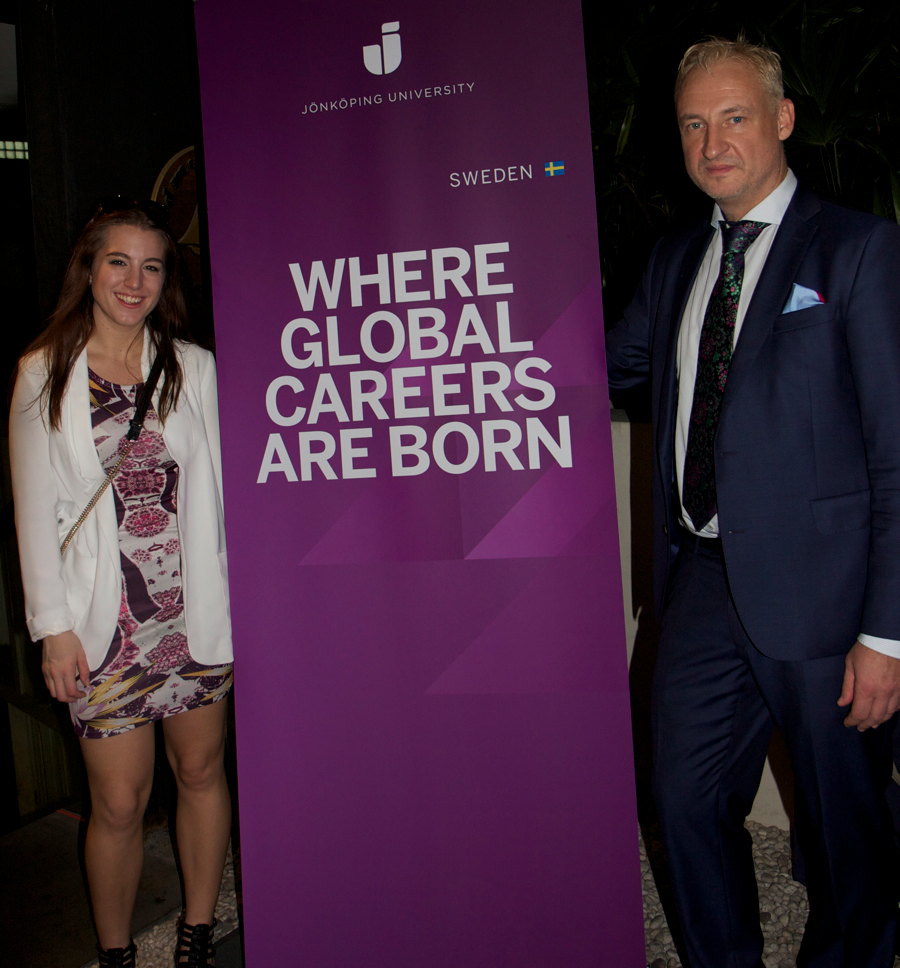
Student Alexandra Malkovich and Professor Roy Andersson
The eight students, who are in their last term of their respective education at the university’s School of Engineering, had landed just a few days prior to the JU-sponsored evening event held at the Scandinavian restaurant Admiral’s Pub & Restaurant. The students will during the spring term do their internship or thesis work in close cooperation with Swedish companies in and around Bangkok.
Also, some other students opted for doing the same in Ho Chih Ninh City, Vietnam.
The International Campuses of the School of Engineering (JTH-IC) are our nodes for implementation of education and research in an international environment, something that is remarkably unique within the world of universities and indeed prepares these students for an international career. Most fittingly the JU slogan is: ‘Where Global Careers Are Born’.
In Bangkok JU collaborate with Rangsit University, Kasetsart University and King Mongkut’s University of Technology North Bangkok.
It is by now an annual recurring event that the TSCC networking is sponsored by JU when the students from Sweden arrive in January, where companies and students can network and share experiences.

“Hotter than I thought”
ScandAsia also got a chance to talk to some of the students, where Alexandra Malkovich was the only female student in the group. She is studying her bachelor degree in Mechanical Engineering, Industrial and Production Management.
“I am doing my last term and should be ready this summer. I will study three courses and then I will do my thesis work at Volvo Trucks.”
She was not yet fully clear what she would be looking into at Volvo Trucks but expected it would have something to do with improvement of processes; within production layout, flow planning etc.
Looking for a university near her hometown she got hooked on JU: ”I wanted study three years and where one works in themes and collaborates a lot. I think it is fun to solve problems. And if you work on solving it as a theme it’s a great thing.”
In Bangkok she will also study three courses as part of her education.
Her first impression of Bangkok: “Much hotter than I had thought. It’s very humid – like a sauna!”
She can imagine herself working partly in Asia in the future.
“I like meeting people, I enjoy speaking English and one learns exciting things in real life that one cannot learn on the Internet.”
 Future outsourcing to Asia
Future outsourcing to Asia
Sebastian Bengtsson will also do his thesis at Volvo Trucks, but with another department as he studies Logistics and Supply Chain Management.
While in Thailand he hopes the stay will generate many new contacts, and he will involve himself and experience cultures and countries in the region and “open up to the world, as one does not get to do back home at a Swedish university.”
“I think there are opportunities with smaller companies planning to outsource production to this region. That is always interesting. And I view myself in a role to start something on my own, and then having been here in Asia and seen how the culture is and what production looks like in factories, to possibly outsource to here if starting up an own business in the future,” Sebastian commented about Southeast Asia.
He will study courses at Rangsit University; Principles of financing and International business management in particular.
Solving hands-on logistics problem
Rasmus Bernardsson is another student within the same education as Sebastian, who will also study 15 university points at Rangsit, as well as be doing his thesis work at Spica Siam, the importer of the Swedish brand Husqvarna. And there he will get to take part in solving a problem task that Spica Siam has concerning its logistics management.
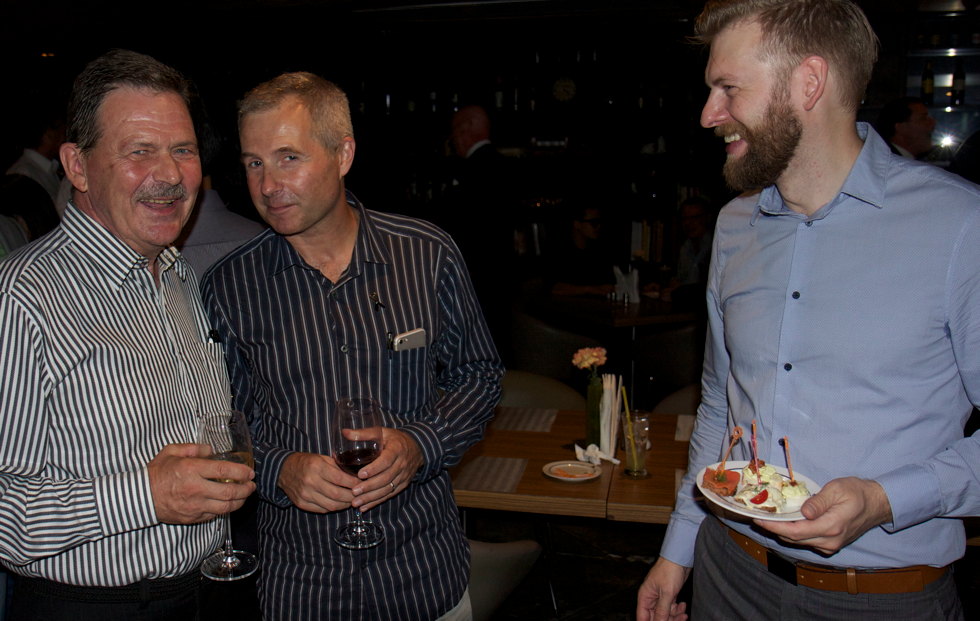
Guests and members of Thai-Swedish Chamber of Commerce at Jönköping University event
“This region is very interesting, especially within production and logistics, which are my fields of interest. Many things are being produced here now and where the northern parts or China is becoming more costly, while Vietnam etc. are seeing increased interest from western companies and where one works with western companies a lot,” replied Rasmus concerning why he chose to go to Thailand. “And one cannot deny that the climate here is fabulous, to get some sun in the winter when living in dark, cold Sweden.”
Back in Sweden he said he has noticed that larger corporations in general are either moving back production from China and northern Asia or moving production down to Southeast Asia.
“Those are the two choices and therefore it is very interesting and media writes about this trend.”
Rasmus can definitely picture himself working in Asia in the future: “It’s a very interesting region. I also want to learn more about religions and cultures here. Depending on how things go during my time here it will be interesting to live and work here as well in the future. We are just starting this five-year period in Thailand. I don’t know really how I will view things after five months but currently I look positively at a future in this region.”
On his first impression about Bangkok: “It’s clearly much larger than one could imagine! There’s very heavy traffic, but people are very friendly and accommodating, something that makes it easier to adapt in this unfamiliar setting.”
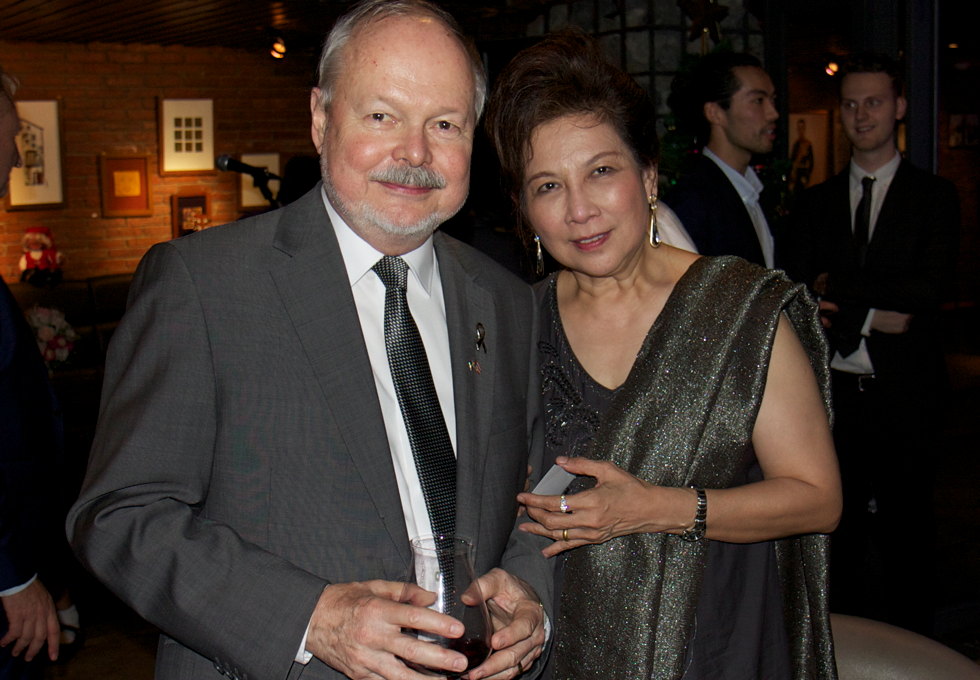
TSCC President/Spica Siam owner Mr Jan Eriksson
Solving inventory management problem
At Spica Siam Rasmus will in his thesis work also get to collaborate closely with their Business Development Manager Phritaree Phiphattanasukkul, who is doing her Masters thesis at the Thai-Swedish company.
“My major is in decision support systems, so I want to do something for the inventory and design a programme to help the upper management in being able to take decisions,” she told ScandAsia at the networking.
“The company has some problem with over stock in the inventory, so I will look at how one can do forecasting for the inventory to be in balance.”
Spica Siam’s owner and also President of TSCC, Mr Jan Eriksson also commented: “First, I find it fantastic that Jönköping University is bringing all these students from Sweden out here. And we at Spica, the importer for Husqvarna, find it excellent that we get two young, very energetic students coming into our company to help us as part of their education. We believe they will be able contribute with a lot to useful insights. We have a specific problem as we added so many products in our range and into our logistics system and the pipeline that we need to improve and streamline it. We think they can do it because it’s a lot about the common sense, and a matter of creating a logical flow and how we can handle it.”

Doing internships or thesis work abroad
By means of the international campuses, JTH-IC, Jönköping University guarantees that students can do their internship or thesis abroad, in collaboration with a company, and usually in combination with academic studies.
Professor Roy Andersson, who is in charge of JTH-IC, personally ensures that these students get help with everything, from finding accommodation to applying for a visa. JTH-IC also promotes Swedish companies that operate globally and are in need of manpower, skills, research and development.
“We are unique in Sweden, and perhaps in the world, with this concept,” said Roy.
This year the students take courses at the three universities Rangsit, Kasetsart and King Mongkut’s University of Technology North Bangkok and do internships or thesis work at Ikea, Volvo Trucks, Electrolux, Aritco and Spica Siam (Husqvarna).
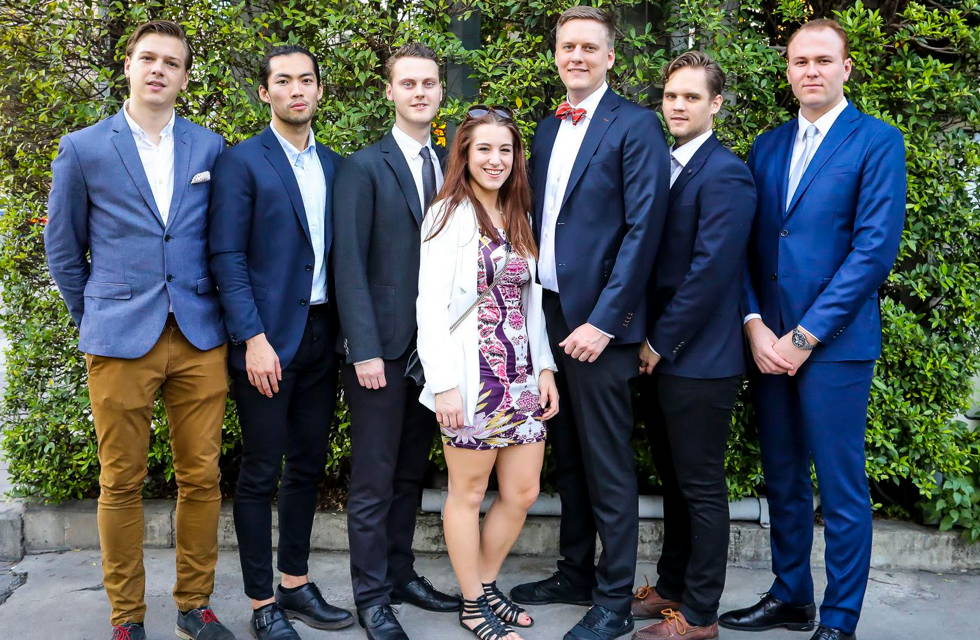
Students photo: Dennis Thern
“Some courses are held specifically for our students but they also take part in the universities’ international courses, matched with what they would have studied if they had remained in Sweden.”
“Other students from the region also study here, but not with our concept of being out at the companies. Our students get to interact with other international students from the Asian region, which is also positive.”
In 2017 Campus South-East Asia also has eight students in Vietnam and two in Singapore. A few more will arrive later in the year as part of their Master studies.
“We have expanded this to include more engineering faculties, this year including mechanical engineering. And next year we are looking at also including civil and computer engineering.”
“We’re trying not to grow too fast, in order to secure quality,” Roy added.
At the same time the School of Engineering will deepen its cooperation with the partner universities by offering more courses suitable for exchange students coming to Sweden.
“Students from those Universities we send students to can also send to us for one term of studies for fee. But they pay to their ordinary school. Then they get an experience from Sweden, which I imagine is attractive for companies here, especially Swedish ones, so it’s a win-win concept.”
In addition, paying students can apply to study a programme of two to three years at JU.
“We often give such students 30 per cent in scholarship. As far as cost-level concerned: it’s half the price to study in Sweden compared to in Australia and the U.K. And cost of living is almost equal in these countries.”
The basic criteria for JU to establish an International Campus includes among other things that its region is attractive for business growth, and that a Swedish business network is already established in the region. There should also be a possibility to develop new partnerships in education and research with one or more partner universities.
“Companies are today international and they want to recruit graduates as new recruits with some experience in internationalisation – which is what we are trying to accomplish,” Roy commented on the market’s needs.
“And in the ranking system for universities, one indicator is how internationalised one is. So that is important for the brand of Jönköping University too.”
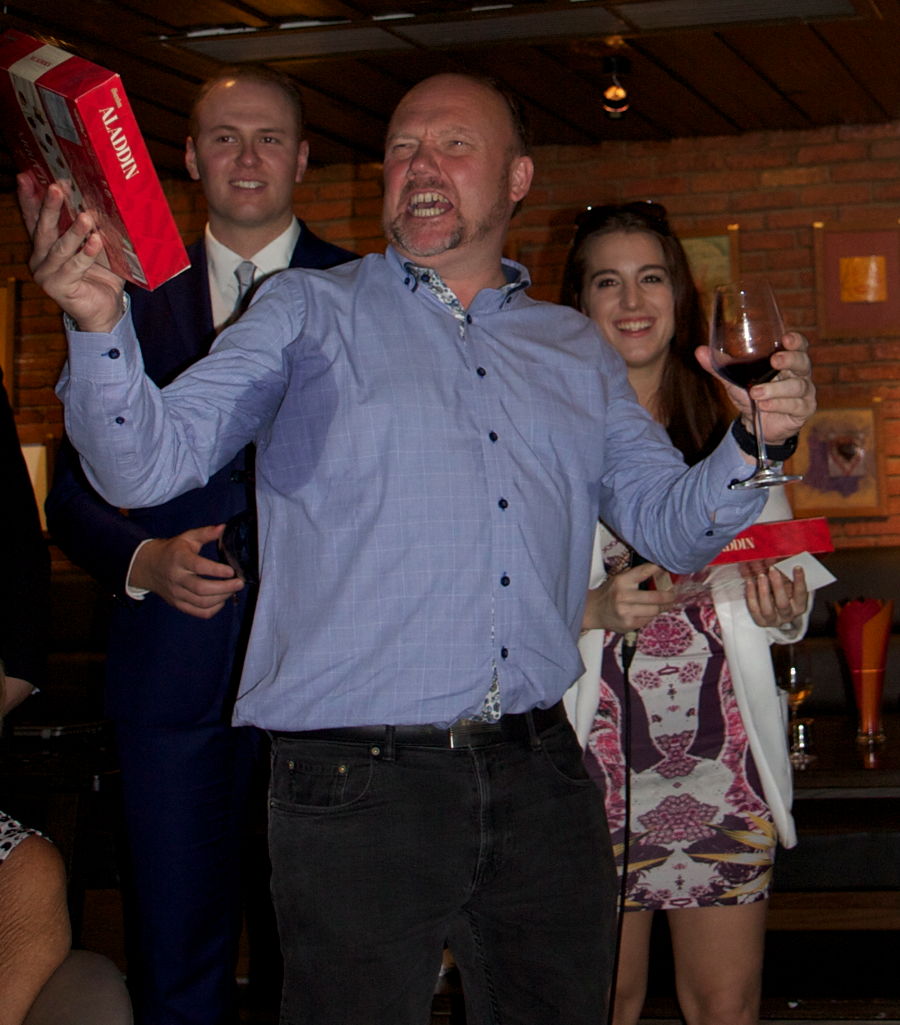
Lucky draw winner Lars Andersson


